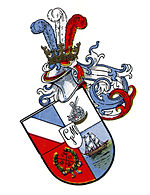Corps Masovia Königsberg zu Potsdam
You can help expand this article with text translated from the corresponding article in German. (December 2017) Click [show] for important translation instructions.
|


The Corps Masovia Königsberg is the only remaining academic
History

The Mazovian people represented a unique minority. They were
, many of them corps members, helped to preserve this heritage.In the 19th century most corps members came from and returned to the remote and poor, but wonderful land. 500 corps members had had their education in
The Corps Masovia was founded in June 1830 and until 1935 played an important role at the
In 2001 a group from Masovia visited Königsberg, and thereafter groups of Masovians exchanged visits with students and faculty from Immanuel Kant University there, but unfortunately, contact was broken off in 2010.[1]
Prussian heritage

In East Prussia many pastors, teachers, judges, physicians, civil servants and mayors proudly showed Masovia's colours, i.e. light blue, white and fire-red. 15 members of the Prussian Parliament (Abgeordnetenhaus) were corps members, three conservatives and twelve liberals. Two sat in the
members illustrate Masovia's unconstricted freedom of spirit.115 corps members fell in both world wars. In the
In 1935 Masovia had to resign herself to the
In January 1950 Masovia joined the Corps Palaiomarchia which had been expelled from Halle (Saale) and restituted in Kiel. When it became evident that this had not been a formal restitution Masovia re-established herself in Potsdam, just 300 years after Prussia becoming a kingdom.
Members
- Horst Ademeit, Major, Knight Cross of the Iron Cross with Oak Leaves
- Gustav Adolf Bergenroth, historian
- Erich Bloedorn, Colonel, Knight Cross of the Iron Cross
- Rüdiger Döhler, Professor of Orthopaedic Surgery
- Gustav Gisevius(1810-1848), pastor in Mazovia
- Ferdinand Gregorovius, historian, honorary citizen of Rome
- Paul Hensel (politician), campaigner for Mazovia
- Jürgen Herrlein, lawyer
- Otto Hesse. Professor of Mathematics in Heidelberg
- National Academy of Sciences
- State Secretary in the Interior Ministry of Nazi Germany
- Friedrich Julius Richelot, Professor of Mathematics in Königsberg
- Ernst Reinhold Schmidt, leader of the German immigrants in Philadelphia, author of The American Civil War (1867)
- André Rüdiger Simon, surgeon at the Imperial College London
- Karl Ludwig Stellmacher (1909-2001), Professor of Mathematics, University of Maryland
- Arthur Zimmermann (1864–1940), State Secretary of Foreign Affairs (Foreign Minister) in the German Empire
See also
References
- ^ a b "ALTE UND NEUE STUDENTENHEIMAT". Deutsches Kulturforum östliches Europa (in German). Retrieved February 15, 2024.
